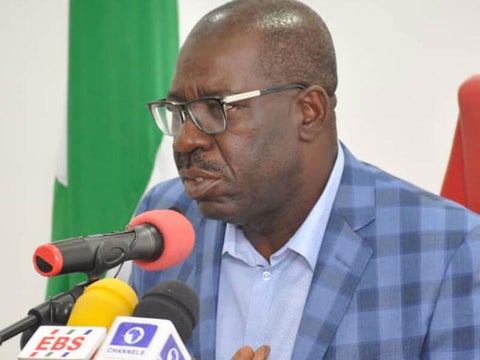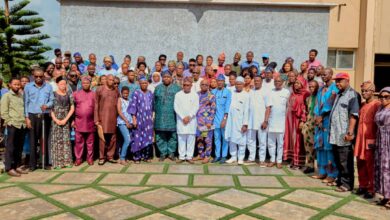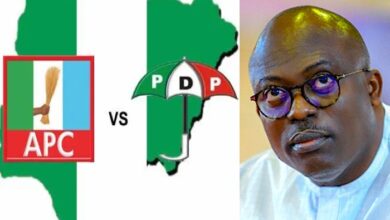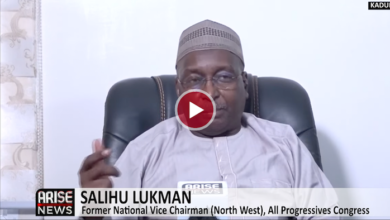Pressure Mounts on APC to Disqualify Obaseki from Governorship Race

Governor Mr. Godwin Obaseki of Edo State
•Party displays aspirants’ credentials
•Court adjourns suit to stop direct primary
The intrigues over who clinches the ticket of the All Progressives Congress (APC) for the September governorship election in Edo State deepened yesterday with pressure on the ruling party to disqualify the Governor, Mr. Godwin Obaseki, from the race.
The pressure came against the backdrop of the unexplained inconsistencies in his certificates, which were among those the party displayed yesterday at its national secretariat in Abuja.
THISDAY learnt those pushing for Obaseki’s debarment told the APC leadership that given the unexplained inconsistencies in his certificates, the party would be faced with a likely repeat of its experience in Bayelsa State where it won the last November governorship election but its candidate, David Lyon, was stopped on the eve of his inauguration following a judgment of the Supreme Court that voided his election.
A five-man panel of the court, led by Justice Mary Peter-Odili, had overruled the declaration of Lyon along with his running mate, Biobarakuma Degi-Eremienyo, as winner of the governorship election.
It had upheld the November 12, 2019 judgement by Justice Inyang Ekwo of the Federal High Court in Abuja which had disqualified Degi-Eremienyo in the election for submitting forged certificates with multiple names to the Independent National Electoral Commission (INEC).
The Supreme Court had ordered INEC to issue fresh certificates to the candidates of the party with the next highest votes and with the required constitutional spread of votes in the results of the election, which are the candidates of the Peoples Democratic Party (PDP).
Among the inconsistencies cited in Obaseki’s certificates are that his O/Level results showed that he has three credits but despite that he spent only three years to allegedly bagged a Bachelor of Arts degree in Classical Studies from the University of Ibadan, Ibadan, in 1976, without an A/Level result.
A/Levels are required for a three-year direct entry course in Nigerian universities. If you have O/Level credits in at least five subjects, then University of Ibadan and a indeed other universities required a mandatory four-year course. The question APC is dealing with include: could three O/Level credits/passes have given Obaseki admission into University of Ibadan as required by law? And if indeed, he got the admission, could he have graduated in three years instead of mandatory four years? Would APC not be facing another Bayelsa scenario when the NWC was blamed for fielding a candidate with a dubious certificate?
Besides, there’s a discrepancy in his degree certificate and that of another governorship aspirant, Mr. Chris Ogiemwonyi, who graduated the same year in University of Ibadan with a Postgraduate Diploma in Petroleum Engineering.
In a petition to the Chairman of the Screening Committee for Edo State Gubernatorial Election, some concerned members of APC in the state, Mr. Edobor Williams, Ugbesia Godwin and Amedu Anakhu, warned that the party would be risking another Bayelsa scenario if Obaseki is not disqualified.
In the petition, they said their action was borne out of their passion for APC’s success in the forthcoming governorship election in the state.
In the petition, dated June 8, 2020 and entitled: ‘Petition For The Disqualification of Godwin Obaseki from Participating in the Gubernatorial Primary Election For Edo State, signed on their behalf by their lawyer, Mr. Chisimdi Chima, the petitioners said their findings after a thorough checks on the governor’s background revealed that in 2016, he submitted a false affidavit to INEC to aid his qualification for the then governorship election
According to them, PDP, which had suspected foul play over the documents submitted to INEC, had approached an Abuja High Court for a Certified True Copy (CTC) of the affidavit of loss of document Obaseki had presented in his form CF 001 to INEC in 2016.
The petitioners said in response to PDP’s request, the Abuja High Court denied issuing any affidavit to the governor.
Based on the above, the petitioners stated that the letter of the court to PDP dated September 28, 2016, “clearly established the element of false affidavit on the part of Godwin Obaseki, which makes him disqualified.”
The petitioners added: “Any political party that fields such a disqualified candidate would be fined under section 31(8) of the Electoral Act.”
The trio said they wanted Obaseki investigated for allegedly falsifying a public document and submitting same to INEC for official use following the governor’s interest in participating in the forthcoming governorship election.
They also called for Obaseki to be investigated over his alleged academic qualifications, which he submitted to INEC in 2016.
They said: “The problem with Obaseki educational history is that it appears fraudulent as no explanation has been reasonably offered why a four-year academic progamme was completed in three years against the established course requirement for the completion of a degree programme in Classical Studies.”
According to them, the governor claimed that he obtained a degree in Classical Studies from the University of Ibadan in three years after gaining admission from Eghosa Grammar School with only three credit pass in his Ordinary Level certificate.
“It is indeed very questionable when one imagines how Mr. Obaseki secured the admission into University of Ibadan with just three credit pass in his ordinary level certificate at a time when the educational system was purely on merit,” they stated.
While they noted that the three-year degree programme was, and is still applicable to only students with Advanced Level certificate/Diploma/National Certificate of Education, they said the governor never showed that he possessed an A’Level certificate to qualify for a three-year programme.
They therefore prayed the screening committee to disqualify Obaseki for alleged falsehood.
Attached to the petition include copies of the sworn affidavit dated June 7, 2016, letter from Chief Ferdinand Orbih SAN, September 2, 2016, letter from the FCT High Court, dated October 28, 2016, Form CF 001 submitted to INEC on July 12, 2016 and University of Ibadan revised/new requirements for U.T.M.E and direct entry.
The petitioners also compared Obaseki’s University of Ibadan certificate with that of Ogiemwonyi, who graduated from the school the same year – 1976, saying there are conspicuous differences.
They noted that while Obaseki’s certificate was signed by just the vice chancellor, Ogiemwonyi’s was signed by both the vice chancellor and the registrar of the institution.
The petitioners are already before the Federal High Court in Abuja, to contest the genuineness of the governor’s credentials.
APC Begins Screening, Display Aspirants’ Credentials
The party yesterday began the screening of six governorship aspirants vying for its ticket.
The party heralded the screening with the display of the credentials of all the governorship aspirants at the national secretariat of the party in Abuja for public scrutiny.
APC said the publication of the credentials of the aspirants was to allow the public participate in the screening as a way of saving the party the type of embarrassment it faced in Bayelsa State where it was denied the fruit of its electoral victory in that state’s governorship election.
Defending the publication of the aspirants’ credentials, the party said the step was necessary to avoid the ‘unpalatable’ experienced it had in Bayesla State.
Besides, Obaseki and Ogiemwonyi, others whose credentials were displayed were Mr. Osagie Ize-Iyamu, Hon. Osaro Obaze, Mr. Iduoriyekemwen Matthew and Dr. Pius Odubu.
According to the details provided by Obaseki, he wrote his West African Examination Council (WAEC) in June 1973 and he had three credits in Christian Religious Knowledge – C6; History – A3; and Geography – C6; while he also had passes in English – 7; Literature – 7 and Chemistry – 8.
However, the governor presented a “To Whom it May Concern” for his Higher School Certificate (HSC) from Institute of Continuing Education Centre, Benin in 1975; while he obtained a Bachelor of Arts degree in 1979 from University of Ibadan. He was born in 1957.
Also, the details provided by Ize-Iyamu revealed that he obtained his WAEC in 1979 with credits and one pass. The details of his WAEC result showed that in English, he scored C4; Literature – C4, History – C4, Mathematics – A3, Chemistry – P7, Biology – A3 and Economics – C4.
He also obtained a Bachelor of Law degree from University of Benin in 1986 and he was called to bar in 1987 and served in the National Youth Service Corps (NYSC) between 1987 and 1988.
The details of Ogiemwonyi’s credentials revealed that he obtained WAEC in 1969 and had seven credits and one pass. He also obtained a Bachelor of Science degree from University of Benin 1974, and served in the NYSC between 1974 and 1975. He further obtained Postgraduate Diploma in Engineering in 1976 from University of Ibadan. He was born in 1951.
Obazee’s credentials showed that he obtained his WAEC in 1992 with five credits and three passes.
He equally obtained Bachelor of Science degree from University of Benin in 1999 and a Master of Public Administration in 2012 from the same university. He served between 2000 and 2002. He was born in 1970.
On his part, Matthew’s details showed that he obtained his WAEC in 1985 with six credits and one pass.
He also obtained a Bachelor of Science degree from University of Benin in 1991and served between 1991 and 1992. He was born in 1966.
Odubu’s details revealed that he obtained his WAEC certificate in 1974, and had seven credits and one pass.
He attended Southern University, Baton, Louisiana in the USA, where he obtained a degree in 1980 (BA Hons) and also obtained a degree in Law from the same university in 1983.
He obtained a Master’s degree from Georgetown University Law Centre, Washington in 1985. He also attended the Nigerian Law School in 1986 preparatory to his call to the bar. He was born in 1957.
Speaking with journalists in Abuja, the National Publicity Secretary of the party, Mallam Lanre Issa-Onilu, said the party published the credentials of the aspirants to avoid the bitter experience it had in Bayelsa State.
He stated: “You know that it had been said that experience is the best teacher. We’ve had experiences that are not so palatable. We have had experiences that are so shocking and we won’t be doing the right thing if we don’t learn from those experiences.
“You will recall what happened in Bayelsa State. We thought we did the best we should, but it turned out that we did not do enough. So, the best thing we have to do now is to go beyond ourselves to the things that may not be known to us.”
He added that besides the fact that the party had published the credentials for anyone with information to help the screening committee, it’s equally taking official steps to verify some of the documents to be sure that the right thing is done.
Asked if the party is contacting the institutions as claimed, he said: “By mere putting it on the board here, making it transparent, putting it before the public, it does mean that people who know them very well; school mates, acquaintances, friends and even enemies could come up with whatever they have. We are expecting help from whatever angle it could come from.”
Issa-Onilu noted that all the party was interested in was to ensure transparency, adding that the ruling party would comply with its own constitution, the Electoral Act, as well as the constitution of the country.
Issa-Onilu, however, explained that there was no need for the party to call for an emergency National Executive Committee (NEC) meeting to resolve the crisis between the National Chairman, Adams Oshiomhole, and Obaseki, saying there’s only contestations of interests and not crisis.
“There is nothing strange in what is going on in Edo. What is important is that at the end of the day, whether the national chairman, whether governor, everybody is subjected to the same rule,” he added.
Court Adjourns Suit Seeking to Stop Direct Primary
The Federal High Court, sitting in Benin City, yesterday adjourned sitting in a suit seeking to restrain NWC of APC from using direct primary to select its candidate in the governorship primary slated for June 22.
Adjourning hearing in the suit till Thursday, Justice M.G. Umar said all parties in the suit must not do anything contrary to the procedure and hearing of the suit.
He also directed parties to file all papers and exchange same within two days.
The suit was filed by the factional State Deputy Chairman of APC, Mr. Kenneth Asemokhai, and a governorship aspirant of the party, Matthew.
The two party chieftains had approached the court seeking to restrain APC from adopting the direct primary, citing COVID-19 and 2018 APC National Executive Council (NEC) resolution as the grounds for their action.
According to the plaintiffs, who were represented by Ken Mozia (SAN) and John Odubela (SAN), APC Constitution provides that the states should suggest mode of primaries to NWC, adding that they have suggested indirect primaries in which 4,000 delegates would participate with 500 delegates representing each ward.
14 Lawmakers-elect Await Lalong Peace Committee
The leader of the 14 lawmakers-elect in Edo State, Hon. Washington Osifo, has said the reconciliation committee set up by the governor has not reached out to them formally.
Obaseki had constituted the committee last week to resolve the almost one-year-old crisis in the state House of Assembly.
He named the Chairman of Northern Governors’ Forum and Governor of Plateau State, Simon Lalong; Lagos State Governor, Mr. Babajide Sanwo-Olu; and Senator Ehigie Uzamere as members of the committees.
Osifo, while speaking with THISDAY yesterday, said the committee was the right thing to do after about a year since the crisis begun.
“That is the best thing to do and this is what we have been asking for since the last one year. Don’t forget at about June 17 last year, the nocturnal inauguration was done and we were shut out. And between then and now, we have been asking that the governor should respect our rights and the rights given to us by our people to go and represent them, so that we can be sworn in.
“So, if after one year, he has seen the need to do the needful, then that is the best thing to do. We are not against it, we are for it, we accept because we have been asking for it and we thank God he has realised that is the right thing to do,” he said.
Osifo noted that while a statement from the governor stated that the committee would begin work immediately, he said no invitation had been extended to them.
Culled from thisdaylive.com





